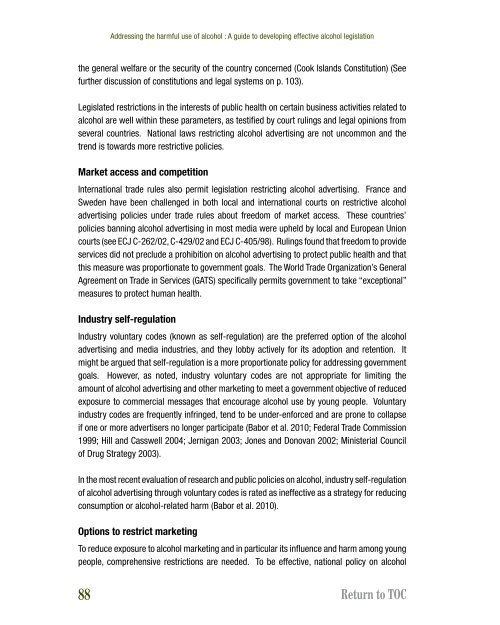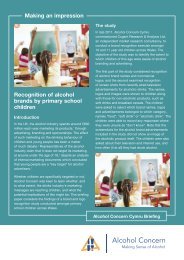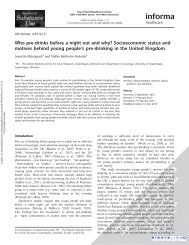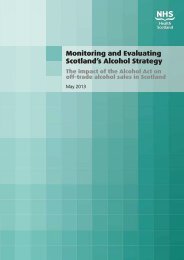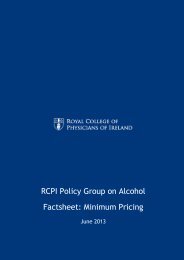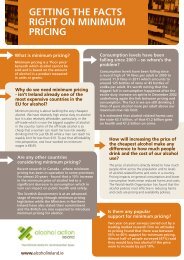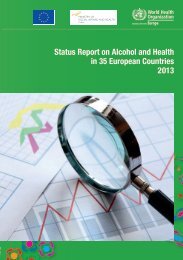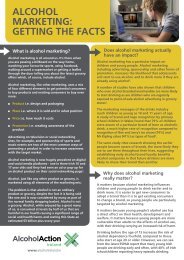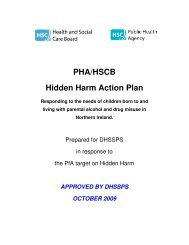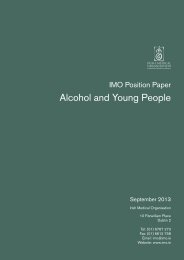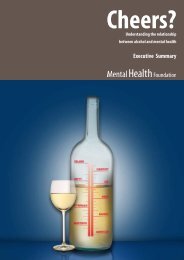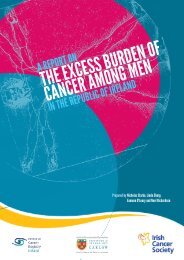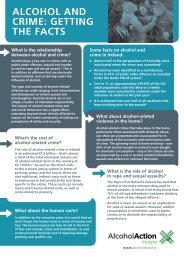Addressing the harmful use of alcohol - WHO Western Pacific Region
Addressing the harmful use of alcohol - WHO Western Pacific Region
Addressing the harmful use of alcohol - WHO Western Pacific Region
Create successful ePaper yourself
Turn your PDF publications into a flip-book with our unique Google optimized e-Paper software.
<strong>Addressing</strong> <strong>the</strong> <strong>harmful</strong> <strong>use</strong> <strong>of</strong> <strong>alcohol</strong> : A guide to developing effective <strong>alcohol</strong> legislation<br />
<strong>the</strong> general welfare or <strong>the</strong> security <strong>of</strong> <strong>the</strong> country concerned (Cook Islands Constitution) (See<br />
fur<strong>the</strong>r discussion <strong>of</strong> constitutions and legal systems on p. 103).<br />
Legislated restrictions in <strong>the</strong> interests <strong>of</strong> public health on certain business activities related to<br />
<strong>alcohol</strong> are well within <strong>the</strong>se parameters, as testified by court rulings and legal opinions from<br />
several countries. National laws restricting <strong>alcohol</strong> advertising are not uncommon and <strong>the</strong><br />
trend is towards more restrictive policies.<br />
Market access and competition<br />
International trade rules also permit legislation restricting <strong>alcohol</strong> advertising. France and<br />
Sweden have been challenged in both local and international courts on restrictive <strong>alcohol</strong><br />
advertising policies under trade rules about freedom <strong>of</strong> market access. These countries’<br />
policies banning <strong>alcohol</strong> advertising in most media were upheld by local and European Union<br />
courts (see ECJ C-262/02, C-429/02 and ECJ C-405/98). Rulings found that freedom to provide<br />
services did not preclude a prohibition on <strong>alcohol</strong> advertising to protect public health and that<br />
this measure was proportionate to government goals. The World Trade Organization’s General<br />
Agreement on Trade in Services (GATS) specifically permits government to take “exceptional”<br />
measures to protect human health.<br />
Industry self-regulation<br />
Industry voluntary codes (known as self-regulation) are <strong>the</strong> preferred option <strong>of</strong> <strong>the</strong> <strong>alcohol</strong><br />
advertising and media industries, and <strong>the</strong>y lobby actively for its adoption and retention. It<br />
might be argued that self-regulation is a more proportionate policy for addressing government<br />
goals. However, as noted, industry voluntary codes are not appropriate for limiting <strong>the</strong><br />
amount <strong>of</strong> <strong>alcohol</strong> advertising and o<strong>the</strong>r marketing to meet a government objective <strong>of</strong> reduced<br />
exposure to commercial messages that encourage <strong>alcohol</strong> <strong>use</strong> by young people. Voluntary<br />
industry codes are frequently infringed, tend to be under-enforced and are prone to collapse<br />
if one or more advertisers no longer participate (Babor et al. 2010; Federal Trade Commission<br />
1999; Hill and Casswell 2004; Jernigan 2003; Jones and Donovan 2002; Ministerial Council<br />
<strong>of</strong> Drug Strategy 2003).<br />
In <strong>the</strong> most recent evaluation <strong>of</strong> research and public policies on <strong>alcohol</strong>, industry self-regulation<br />
<strong>of</strong> <strong>alcohol</strong> advertising through voluntary codes is rated as ineffective as a strategy for reducing<br />
consumption or <strong>alcohol</strong>-related harm (Babor et al. 2010).<br />
Options to restrict marketing<br />
To reduce exposure to <strong>alcohol</strong> marketing and in particular its influence and harm among young<br />
people, comprehensive restrictions are needed. To be effective, national policy on <strong>alcohol</strong><br />
88 Return to TOC


